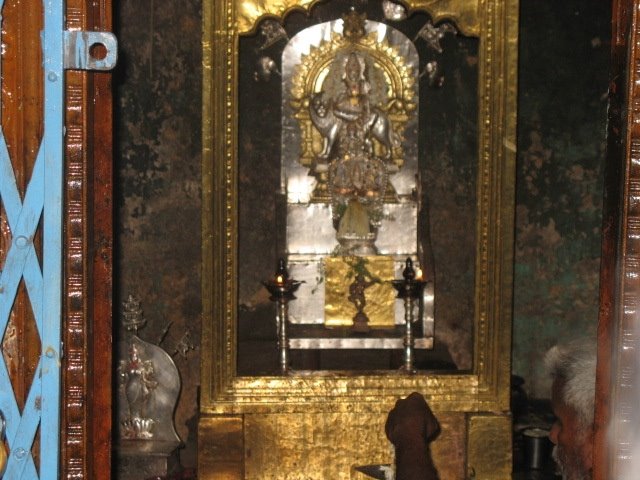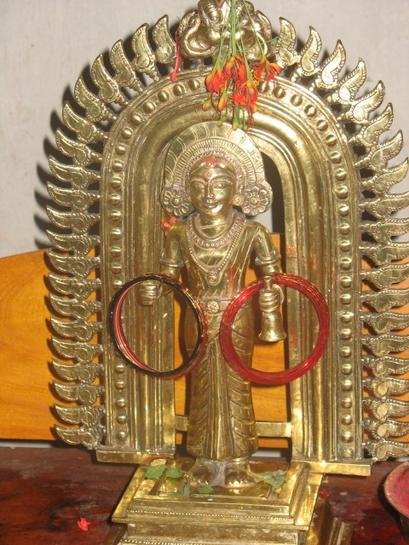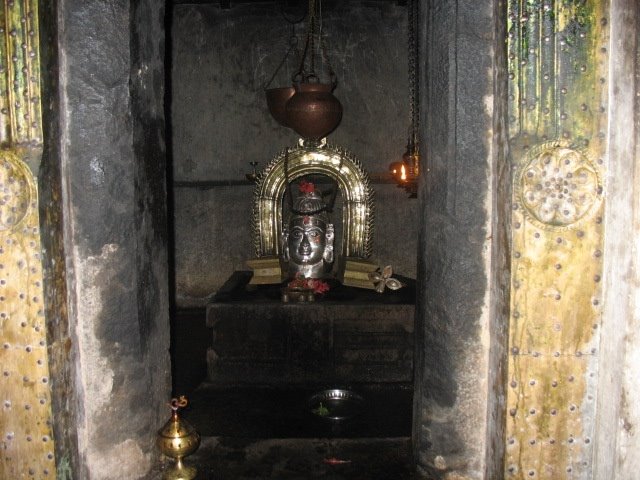
The auspicious festival of Raksha Bandhan depicting the love between a brother and sister It falls in the month of Shravana, the month when the rains are receding, sea is calming down and weather is pleasant. The month is important to the farmers, to the fishermen and to the voyagers and businessmen. And in India all such days and months are a matter of celebration. These celebrations are in other words a kind of thanks giving to the Gods and is celebrated with great fervour and excitement all over India, particularly North India.
On this day sister’s tie a scared thread called 'Rakhi' around her brother's wrist. She prays to God for the safety of her brother and to lead him on a good path. The brother in return feeds her sweets and blesses her with good wishes and accepts the responsibility of protecting her. In Indian tradition the frail thread of Rakhi is considered stronger than iron chains as it binds brothers and sisters in an inseparable bond of love and trust. Raksha Bandhan is meant not just for siblings, but for protection of any loved one. 'Raksha' means protection and 'bandhan' means bond.
However, today we find people are being led away from the true meaning of such occasion because they mindlessly follow traditions, instead of finding the true meaning and base of these traditions. Does any one really know why Raksha Bandhan is celebrated ? The roots of most of the Hindu festivals can be traced to Hindu Mythology.
The ancient treatise Bhavishya Purana narrates the story of Indra and Indrani. It states that once Lord Indra was facing reverses in battle against demons led by King Bruta. At this stage Indra sought the help of Guru Brihaspati. The Sage advised him to tie a sacred thread powered by mantras on the auspicious day of Shravan Purnima. Following the suggestion, Indra's consort Indrani tied the sacred thread on Indra’s wrist for protection and assurance on the decided time. The Rakhi helped Gods win the battle against the demons. Raksha Bandhan is also mentioned in our epics as a festival of Gods. It is said that Yamuna, the sister of Yama, the lord of Death used to tie rakhi to her brother on every Shravan Purnima. Yama was so impressed by the occasion that he declared that who ever got a Rakhi tied from his sister would become immortal. From that day onwards girls tie rakhi to their brothers wishing them a long life and while tying the rakhi, the girls chant "Yena baddho, Balee raajaa daanavendro mahaabalah tena twaam anubadhnaami rakshe maa chala maa chala" meaning "I am tying a Rakhi on you, like the one on mighty demon king Bali. Be firm, O Rakhi, do not falter." The Brothers in turn bestow their blessings by promising to take care of the sisters through thick and thin.
The legend relates that the mighty Demon King Raja Bali was a great devotee of Lord Vishnu. When Lord Indra could not counter Bali in war, he went to Lord Vishnu for help. Vishnu pushed Bali to the neither world (Patala Lok). But Lord Vishnu promised King Bali immortality, till he had crowned Indra and also queitly decided to guard the kingdom of Patala leaving his own abode in Vaikunth. Goddess Laxmi, the consort of Lord Vishnu, wished the Lord to be back at Vaikunth. Disguised as a Brahmin woman she went to Bali to seek refuge till her husband returned home, after finishing all his important tasks. On the Shravan Purnima Day Goddess tied the sacred thread to Bali and prayed for his well being. Bali was touched by this gesture. He accepted her as his sister and requested her to make a wish. At this she revealed herself and told him that it was Lord Vishnu himself guarding his Kingdom. King Bali immediately requested the Lord to return to his abode. Which the Lord did so. Thus due to the Rakhi came all happiness and wealth to Goddess Laxmi. All auspicious things happened. From that day onwards, girls tie rakhi to their brothers and seek their blessings.
There is also an historical reason for this wonderful festival. During the invasion of Alexander the Great. It is said that Puru was a mighty king. Alexander had to face stiff resistance from him. Worried about her husband's fate, Alexander's wife seeked audience with King Puru. She requested him to accept her as his sister. Puru obliged her and promised not to harm Alexander. The Rakhi on Puru's hand is said to be the savior of Alexander.
In the medieval times, rakhi meant a call for help. The Rajput kingdoms were being attacked by the Muslim rulers. The Royal ladies solicited help from the fellow Rajput rulers sending them Rakhi. The Rajputs considered it their responsibility to respond to the request and help them. A famous incident relates how the widowed queen of Chittor, Rani Karnawati sent rakhi to Emperor Humayun to help her save the honor of the dependent Ladies. Humayun immediately followed the request and reached there with his troops. He despite all his efforts reached there late and the royal ladies had already performed the Jauhar.
All this signifies that Rakhi was not always only a brother sister festival. It has to fulfill the basic need of protection. It was an un- maligned prayer for good will and protection. It is said that at one time the Sages tied the sacred thread for protection to themselves and their followers.
In Pre-independence India, Gurudev Rabindranath Tagore started Rakhi Utsavas, a congregation signifying the harmonious relationship amongst the community. It was a vow for peaceful existence and commitment to all the members of society. This was Raksha Bandhan's universal outlook.
In today’s society Rakhi though celebrated, as a sibling's festival, if taken in true sense has a much broader perspective. The festival encompasses true sense of peace and brotherhood. The day is all about “Raksha” or protection, not just for self but for the dear ones, for peaceful existence of the human race The values propagated by the occasion if inculcated by all human beings can bring the much-needed relief from the ongoing violence and mistrust.
Lets me conclude with this small ancient poetic verse :
"May all be happy
May all be free from ills
May all behold only the good
May none be in distress."
This has always been the idea of an ideal Hindu society, which is the need of the hour in today’s violent times.











1 comment:
Such a wonderful topic you have written on.Truly said, people have forgotten the right meaning of the festivals that they celebrate.
Thanks for enlightening our knowledge. Great work and lovely pictures.
Whenever tired and want to relax, visit http://www.games-alpha.blogspot.com and play these games to refresh and start your work again.
All the very best in everything you do.
Post a Comment